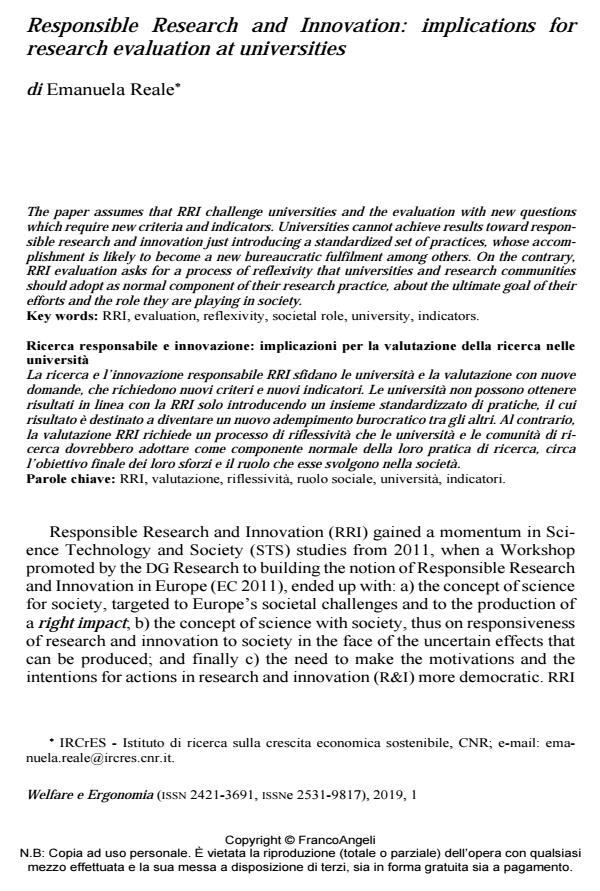Responsible Research and Innovation: implications for research evaluation at universities
Titolo Rivista WELFARE E ERGONOMIA
Autori/Curatori Emanuela Reale
Anno di pubblicazione 2020 Fascicolo 2019/1 Lingua Inglese
Numero pagine 12 P. 55-66 Dimensione file 220 KB
DOI 10.3280/WE2019-001006
Il DOI è il codice a barre della proprietà intellettuale: per saperne di più
clicca qui
Qui sotto puoi vedere in anteprima la prima pagina di questo articolo.
Se questo articolo ti interessa, lo puoi acquistare (e scaricare in formato pdf) seguendo le facili indicazioni per acquistare il download credit. Acquista Download Credits per scaricare questo Articolo in formato PDF

FrancoAngeli è membro della Publishers International Linking Association, Inc (PILA)associazione indipendente e non profit per facilitare (attraverso i servizi tecnologici implementati da CrossRef.org) l’accesso degli studiosi ai contenuti digitali nelle pubblicazioni professionali e scientifiche
The paper assumes that RRI challenge universities and the evaluation with new questions which require new criteria and indicators. Universities cannot achieve results toward responsible research and innovation just introducing a standardized set of practices, whose accomplishment is likely to become a new bureaucratic fulfilment among others. On the contrary, RRI evaluation asks for a process of reflexivity that universities and research communities should adopt as normal component of their research practice, about the ultimate goal of their efforts and the role they are playing in society.
La ricerca e l’innovazione responsabile RRI sfidano le università e la valutazione con nuove domande, che richiedono nuovi criteri e nuovi indicatori. Le università non possono ottenere risultati in linea con la RRI solo introducendo un insieme standardizzato di pratiche, il cui risultato è destinato a diventare un nuovo adempimento burocratico tra gli altri. Al contrario, la valutazione RRI richiede un processo di riflessività che le università e le comunità di ricer-ca dovrebbero adottare come componente normale della loro pratica di ricerca, circa l’obiettivo finale dei loro sforzi e il ruolo che esse svolgono nella società.
Keywords:RRI, valutazione, riflessività, ruolo sociale, università, indicatori.
- ANVUR (2015). La valutazione della terza missione nelle università italiane. Manuale per la valutazione. -- Available at: http://www.anvur.org (27/02/2015).
- Barré R. (2010). Towards social robust S&T indicators: indicators as debatable devices, enabling collective learning. Research Evaluation, 19(3): 227-231.
- Callon M., Lascoumes P. and Barthe Y. (2009). Acting in an Uncertain World: An Essay on Technical Democracy. Cambridge: MIT Press.
- EC. (2011). DG Research Workshop on Responsible Research and Innovation in Europe. -- Available at: http://ec.europa.eu/research/science-society/document_library/pdf_06/responsible-research-and-innovation-workshop-newsletter_en.pdf (01/08/2014).
- Felt U., Wynne B., Callon M., Gonçalves M.E., Jasanoff S., Jepsen M., Joly P.-B., Konopasek Z., May S., Neubauer C., Rip A., Siune K., Stirling A. and Tallacchini M. (2007). Taking European Knowledge Seriously. Report of the Expert Group on Science and Governance to the Science, Economy and Society Directorate. Brussels: Directorate General for Research. European Commission. -- Available at: http://ec.europa.eu/research/science-society/documentlibrary/pdf 06/european-knowledge-societyen.pdf (04/02/15).
- Gibbons M., Limoges C., Nowotny H., Schwartzman S., Scott P. and Trow M. (1994). The new production of knowledge. London: Sage.
- Guston D. (2000). Between politics and science. Assuring the integrity and productivity of research. Cambridge: Cambridge University Press.
- Guston D. (2012). The Pumpkin or the Tiger? Michael Polanyi, Frederick Soddy, and Anticipating Emerging Technologies. Minerva, 50(3): 363-379.
- Hessels L.K., van Lente H. and Smits R. (2009). In search of relevance: The changing contract between science and society. Science and Public Policy, 36(5): 387-401.
- Kuhlmann S., Edler J., Ordóñez-Matamoros G., Randles S., Walhout B., Gough C. and Lindner R. (2016). In: Lindner R., Kuhlmann S., Randles S., Bedsted B., Gorgoni G., Griessler E., Loconto A. and Mejlgaard N., Navigating Towards Shared Responsibility in Research and Innovation. Approach, Process and Results of the Res-AGorA Project. Fraunhofer Institute for Systems and Innovation Research ISI. Germany, pp. 135-160. -- www.responsibility-navigator.eu.
- Latour and Woolgar (1979). Laboratory Life: The Construction of Scientific Facts. Beverly Hills: Sage Publications.
- Lepori B. and Reale E. (2012). S&T indicators as a tool for formative evaluation of research programs. Evaluation, 18: 451-465.
- Martin B.R. (2003). The Changing Social Contract for Science and the Evolution of the University. In: Geuna A., Salter A.J. and Steinmuller W.W., editors, Science and Innovation: Rethinking the rationales for funding and governance, pp. 7-39. Cheltenham/Northampton: Edward Elgar Publishing.
- Owen R., Macnaghten P. and Stilgoe J. (2012). Responsible research and innovation: From science in society to science for society, with society. Science and Public Policy, 39: 751-756.
- Pallet H. and Chilvers J. (2014). Organizations in the making: Learning and intervening at the science-policy interface. Progress in Human Geography, Science and Public Policy, online first, 1-21.
- Patton M.Q. (2002). A Vision of Evaluation that Strengthens Democracy. Evaluation, 8(1): 125-139.
- Plottu B. and Plottu E. (2009). Approaches to Participation in Evaluation. Some Conditions for Implementation. Evaluation, 15(3): 343-359.
- Randles S. and Laredo P. (2012). Responsible Innovation and Responsible Governance (RI-RG): Reflections on Social Inquiry and Method. S.NET Conference, Twente, Netherlands 22-25 October.
- Reale E. (2014). Governance. In: The Contribution of Science and Society (FP6) and Science in Society (FP7) to a Responsible Research and Innovation. A Review, paper prepared for the EU SiS-RRI Conference, Rome, 19-20 November 2014, CNR Ed., Roma, pp. 153-186.
- Rip A. (2003). Societal challenges for R&D evaluation. In: Shapira P. and Kuhlman S., Learning from Science and Technology Policy Evaluation. Cheltenham UK: Edward Elgar.
- Stilgoe J., Owen R. and Macnaghten P. (2013). Developing a framework for responsible innovation. Research Policy, 42: 1568-1580.
- Von Schomberg R., editor (2011). Towards Responsible Research and Innovation in the Information and Communication Technologies and Security Technologies Fields. Brussels: European Commission.
Emanuela Reale, Responsible Research and Innovation: implications for research evaluation at universities in "WELFARE E ERGONOMIA" 1/2019, pp 55-66, DOI: 10.3280/WE2019-001006